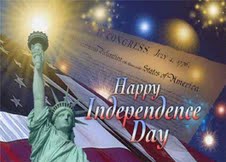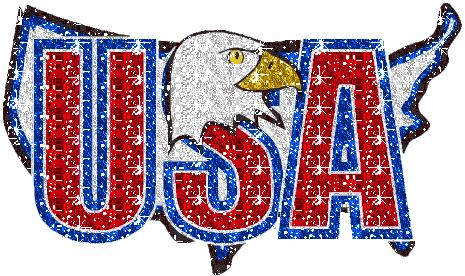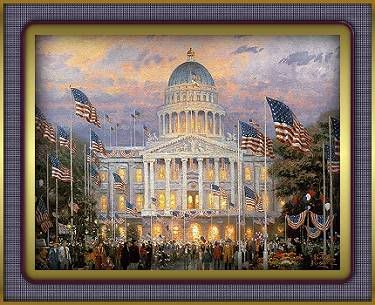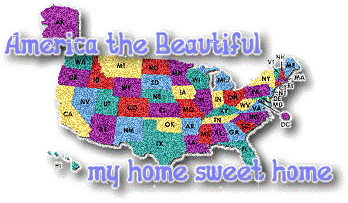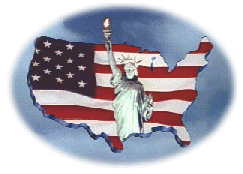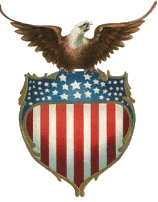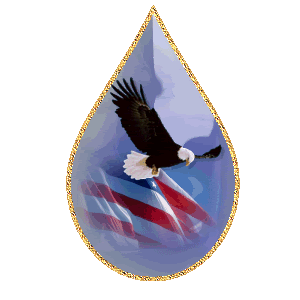HAPPY INDEPENDENCE DAY
Nineteen years after the landing of the Mayflower at Plymouth, what is often considered the first 'constitution' of our country was drawn up by colonists from Hartford, Windsor, and Wethersfield, titled: 'The Fundamental Orders'. This document, which limited the power of government and gave men the right to vote, set forth and established a 'representative sytem' of government. Though colonists were under the rule of Great Britain, they sought to establish an ecclesiastical society which would be subject to their own rules and regulations.
The January 14, 1639, orders were adopted and transcribed into the official colony records, becoming the 'constitution' for the colonial form of government (which, by the way is why Connecticut is called 'The Constitution State'). People wanted a democratic form of government ~ they wanted to escape tyranny ~ they wanted to live under their own rule.
The colonists were unhappy with British rule and the unrest and discontent grew. There was also the issue of taxation. Though the colonists paid their taxes to Britain, they did not have any representation there and thus were unable to have a say in what took place. The "Taxation without Representation" issue, lead to King George sending extra troops to the colonies to keep under control any ideas of rebellion. Tensions grew, and while the King's troops were advancing on Concord Massachusetts in April of 1775, Paul Revere was to make his famous ride during which he gave warning to the people, "The British are coming, the British are coming!". The 'unofficial' beginning of the War for Independence began with the 'shot heard around the world' which was fired at the Battle of Concord.
In June of 1776, a statesman from Virginia, Richard Henry Lee, proposed a motion of an 'independence resolution' to the Second Continental Congress which called for the colonies' total independence from Great Britain's rule. A committee was formed to draft the declaration, which became the 'Declaration of Independence'. Members of the committee included Thomas Jefferson, Benjamin Franklin, John Adams, Robert R. Livingston, and Roger Sherman. Chairman of the committee was Thomas Jefferson (later to be the third president of the United States). He wrote the first draft of the Declaration which was presented to the congress on June 28.
On July 2, the Congress voted in closed session to declare independence from Great Britain, accepting Richard Henry Lee's 'independence resolution'.
Franklin and Adams made minor changes to the first draft of the Declaration, presenting a final draft to Congress on July 4. A vote was taken from the representatives of the 13 British colonies ~ 9 voted in favor (New Hampshire, Massachusetts, Connecticut, Rhode Island, Maryland, New Jersey, Virginia, North Carolina, and Georgia), 2 voted no (Pennsylvania and South Carolina), 1 was undecided (Delaware), and1 abstained (New York).
On July 4, 1776, the British colonies approved and adopted the wording of the Declaration which declared their independence from Great Britain, rejected any allegiance to the British monarchy, and claimed a new and sovereign nation ~ the United States of America. The President of the Continental Congress, John Hancock, then signed the Declaration, making it an official document.
July 4, 1776 ~ INDEPENDENCE DAY!!!!
The very next day, copies of the Declaration were distributed to the people; it was printed in the Pennsylvania Evening Post on July 6; and was read in public on July 8 in Philadelphia's Independence Square.
On July 19, 1776, when New York moved from 'abstain' to 'yes', Congress ordered the Declaration to be engrossed on parchment and signed by all members. On August 2, 1776, 50 members of Congress were to sign the 'Declaration of Independence'. The signers were:
CONNECTICUT - Samuel Huntington, Roger Sherman, William Williams, Oliver Wolcott
DELAWARE - Thomas McKean, George Read, Caesar Rodney
GEORGIA - Button Gwinett, Lyman Hall, George Walton
MARYLAND - Charles Carroll, Samuel Chase, William Paca, Thomas Stone
MASSACHUSETTS - John Adams, Samuel Adams, Elbridge Gerry, John Hancock, Robert Treat Paine
NEW HAMPSHIRE - Josiah Bartlett, Matthew Thornton, William Whipple
NEW JERSEY - Abraham Clark, John Hart, Francis Hopkinson, Richard Stockton, John Witherspoon
NEW YORK - William Floyd, Francis Lewis, Philip Livingston, Lewis Morris
NORTH CAROLINA - Joseph Hewes, William Hooper, John Penn
PENNSYLVANIA - George Clymer, Benjamin Franklin, Robert Morris, John Morton, George Ross, Benjamin Rush, James Smith, George Taylor, James Wilson
RHODE ISLAND - William Ellery, Stephen Hopkins
SOUTH CAROLINA - Thomas Heyward Jr., Thomas Lynch Jr., Arthur Middleton, Edward Rutledge
VIRGINIA - Carter Braxton, Benjamin Harrison, Thomas Jefferson, Francis Lightfoot Lee, Richard Henry Lee, Thomas Nelson Jr., George Wythe
The first celebration of Independence Day took place on July 4, 1777, and has since been celebrated annually throughout the United States to commemorate the signing of our 'Declaration of Independence' which took place in Philadelphia, Pennsylvania, on July 4, 1776!!!
In 1941, Congress declared July 4 as a federal legal holiday.
For 2010, the President of the United States has issued a message about Independence Day, and it can be found here:
http://www.whitehouse.gov/the-press-office/message-president-regarding-independence-day
~ Rev. Lin
